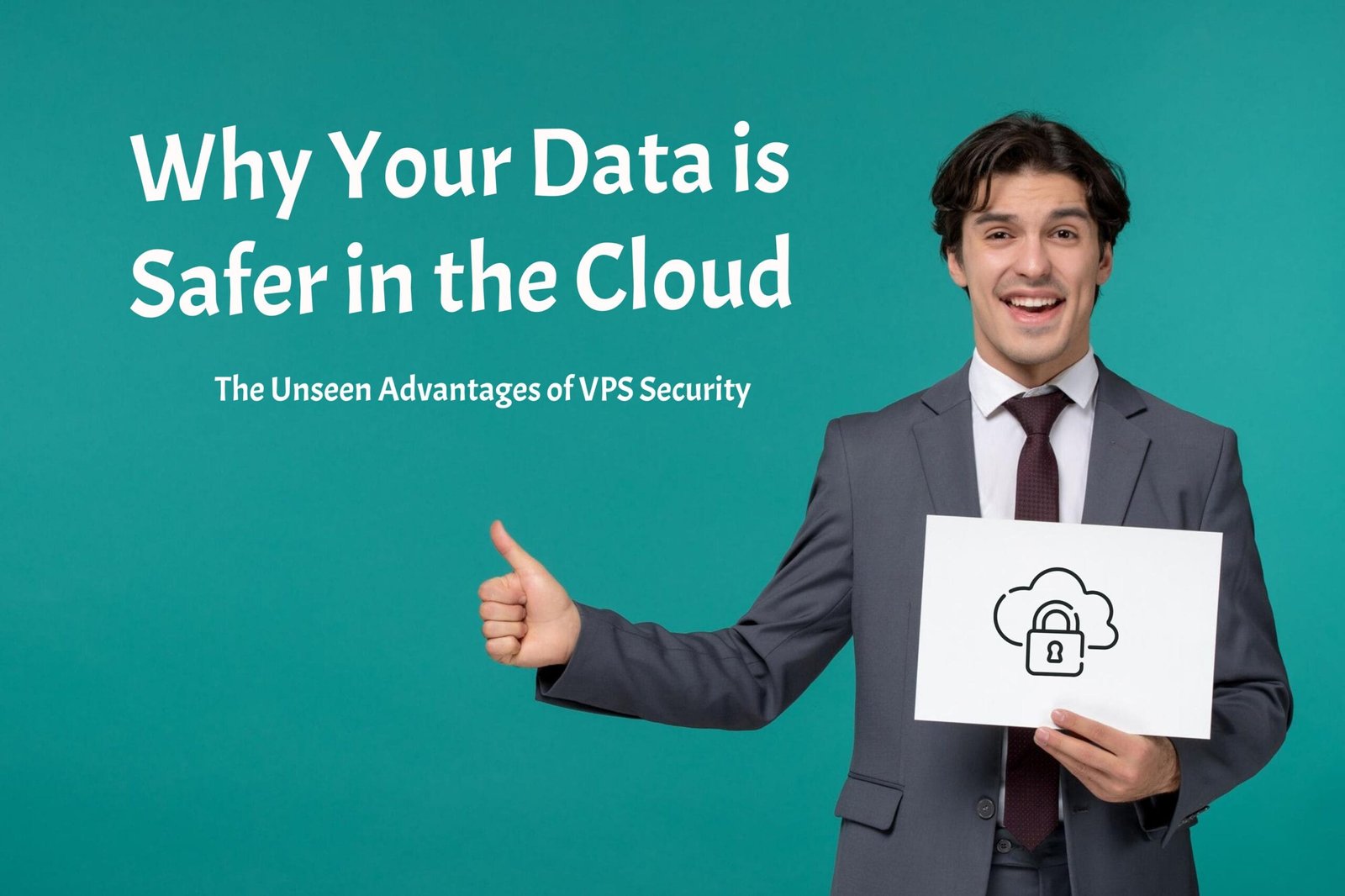Why Your Data is Safer in the Cloud: The Unseen Advantages of VPS Security
Nowadays, keeping our online stuff safe is super important. Some folks think it’s better to store their digital files and info on their own computers or hard drives. But here’s the twist – using the cloud, and especially something called Virtual Private Servers (VPS), might be safer. This piece is all about showing you the cool stuff about VPS that you might not know. It’s like saying, moving your digital life to the cloud could be your best move against online baddies.
Jumping on the cloud bandwagon isn’t just a fad. It’s a smart choice for anyone looking to up their security game. VPS isn’t just another option; it’s packed with perks like top-notch secret codes (encryption) and 24/7 watchfulness that old-school methods can’t keep up with. So, let’s get into why keeping your data in the cloud isn’t as risky as it sounds and might be a haven.
Understanding VPS and Its Role in Cloud Data Security
Imagine having your little safe spot on a big computer, that’s what a Virtual Private Server (VPS) is like. It’s as if you’ve got your room in a large building, but this room is made using some tech tricks. This space is just for you, with your mini-computer setup, your area, and, most importantly, your security.
What makes a VPS neat is how it keeps your stuff separate from everyone else’s. It’s not like those places where everyone’s things are all jumbled together. With a VPS, it’s more like having your apartment with a top-notch security system, rather than living in a big shared room with just one lock for everyone.
The best part? You can set up your security exactly how you like it. You’re not stuck with the basic security that everyone else has. You can add extra protection, making it tough for any internet bad guys to get to your stuff.
So, a VPS is like a superhero for your online safety. It gives you your secure spot, lets you choose how you want to protect it, and helps keep your digital stuff safe. It’s a big help in making sure you stay safe online.
VPS as a Cloud Data Security Layer
When we look closer at how we keep our online stuff safe, Virtual Private Servers (VPS) are like a strong shield. They protect our digital information from the many dangers that hide online. It’s not just about keeping things separate; it’s about making a safe space where every piece of your information is looked after very carefully.
What’s smart about VPS is that it gives you your special area, kind of like having a private, safe room in a huge house. In this room, your information isn’t just sitting there; it’s being watched over all the time. Things like firewalls, systems that spot intruders, and programs that check for nasty software are like guards that stand watch, making sure your information stays safe and sound.
Also, the safety features of a VPS can change as needed. They can grow stronger when you have lots of online visitors or when a new threat pops up. This ability to change is super important today, with all the clever ways that bad guys try to sneak into our digital lives.
In short, a VPS is a strong layer of safety in the online world, offering a safe spot for your information. This safety net keeps getting better, always ready for new challenges and using the latest in security tech to keep your digital world secure. As we dig deeper, the benefits of VPS in keeping our online stuff safe become even clearer, showing just how important it is for protecting our information.
10 Best Practices for Securing Cloud Data With VPS
When you’re keeping your digital stuff safe on a Virtual Private Server (VPS), there are some smart moves you can make to turn your VPS into a super-secure spot, kind of like a digital Fort Knox.
- Regular Updates and Patch Management: always keep your VPS and its apps up to date. Regular updates fix any weak spots, slamming the door shut on hackers.
- Strong Authentication Measures: double down on your login checks. Use something called multi-factor authentication (MFA) to make sure it’s you trying to get in. Even if someone guesses your password, this extra step can keep them out.
- Advanced Encryption: Don’t forget about encryption. It scrambles your data so only people with the key can read it. Encrypt your data whether it’s just sitting there or if you’re sending it somewhere.
- Robust Firewall Configuration: A strong firewall is a must. It’s like a bouncer for your VPS, deciding what can come in and what should stay out. Keep it sharp by updating your rules.
- Intrusion Detection and Prevention Systems (IDPS): Use tools that watch for and block sneaky intruders, catching them before they can cause trouble.
- Regular Backups: Back up your data regularly. If something goes wrong, like a cyber-attack, you’ll be able to get back on your feet quickly with everything intact.
- Access Control and Least Privilege: Be stingy with access. Only give people the permissions they need for their jobs. This way, there’s less chance of someone accidentally or purposely spilling the beans.
- Vulnerability Scanning and Penetration Testing: Check for weak spots often with vulnerability scans and tests that pretend to break in. This way, you can fix any issues before the bad guys find them.
- Secure Network Configuration: When connecting remotely, use secure ways like VPNs and SSH. This keeps your data safe while it’s on the move.
- Continuous Monitoring and Logging: Always keep an eye on what’s happening on your VPS. Continuous monitoring and detailed logs help you spot anything fishy and can be a lifesaver if you need to investigate an issue.
Stick to these tips, and you’ll be way ahead in keeping your digital treasures safe in the cloud. Being alert and taking action beforehand is key in the online world to protect your precious data.
Implementing Multi-Factor Authentication for Added Security
In the world of keeping your online stuff safe, especially with a Virtual Private Server (VPS), using Multi-Factor Authentication (MFA) is like having a super-strong lock on your door. MFA isn’t just about using a password. It asks for a couple more proofs that it’s you trying to get in. This makes it super tough for anyone who shouldn’t be there to sneak in.
What’s great about MFA is how simple yet effective it is. It’s all about using a mix of things to prove it’s you – like a password (something you know), your phone or a special key (something you have), and maybe even your fingerprint or face (something you are). This combo means that even if someone gets hold of one of these things, they still can’t get in because they need the other pieces too.
Setting up MFA on your VPS isn’t hard and it makes a big difference. Most of the time, the company that gives you the VPS has MFA options ready to go, so you don’t need to be a tech whiz to get it working.
It’s also important to make sure everyone who needs to use it knows how it works and why it’s important. A little bit of teaching and some easy-to-follow steps can make sure everyone’s on board and knows how to use MFA right.
But, it’s also key to remember that it shouldn’t be a pain to use. Yes, we want things to be super secure, but if it’s too complicated, people might get annoyed and not use it the way they should. Finding that sweet spot between tight security and not driving everyone crazy is the goal.
Adding MFA to your VPS is like adding an extra strong gate to your online castle. It checks who’s trying to come in and makes sure only the right people can get through. As we all try to stay one step ahead of online bad guys, having tools like MFA is super important for keeping our digital lives safe.
Can a VPS Be Hacked?

Can a VPS Be Hacked?
You know, it’s a question that seems to pop up a lot: “Can a Virtual Private Server (VPS) get hacked?” Well, the short answer is a bit of a bummer—yes, it can. Just like anything else that’s hooked up to the internet, a VPS isn’t bulletproof when it comes to those crafty hackers out there. But hey, don’t throw in the towel just yet! By getting to know the weak spots and stepping up your game, you can cut down on those risks.
So, what makes a VPS an easy target? Usually, it’s the usual suspects: passwords that are too easy to guess, software that’s been gathering dust, settings that got a bit wonky, and network doors left wide open. Hackers are always sniffing around for these slip-ups, ready to pounce with everything from brute force battering rams to slick phishing tricks to sneak in uninvited.
But here’s the kicker: despite the doom and gloom, beefing up your VPS security isn’t rocket science. Staying on top of updates, clamping down with some solid authentication moves, encrypting your data, and arming yourself with security goodies like firewalls and intrusion detectors can build a pretty tough fortress to crack.
And let’s not forget, it’s a team effort. The folks who dish out VPS services have a big part to play in keeping the foundations secure, making sure the physical bits and bobs are under lock and key, and throwing in some basic defenses for good measure. On the flip side, users have got to keep their end of the fort secure—tending to their apps, keeping a tight rein on who gets in, and staying on their toes.
What’s cool about a VPS, though, is the freedom and control it hands you. Unlike being crammed into a shared hosting setup where your safety is kinda tied to everyone else’s, a VPS lets you customize your security setup to fit your own needs.
Wrapping it up, yes, a VPS can fall prey to hackers, but it’s not all doom and gloom. By getting wise to the risks and layering up your defenses, you can make a hacker’s job a whole lot tougher. Remember, in the online world, staying safe isn’t a one-and-done deal—it’s all about keeping your guard up and rolling with the punches.
Why cPanel VPS Hosting?
Diving into the world of Virtual Private Servers (VPS) can be quite the adventure, especially if you’re not too cozy with all that command-line jazz. That’s where cPanel comes into play, shining like a lighthouse of ease and efficiency in a sea of technicalities. Meshing the oomph and adaptability of VPS with the no-sweat, user-friendly vibes of cPanel, this combo is a hit across the board—from web wizards to business moguls.
What’s so magnetic about cPanel VPS hosting is its no-fuss control panel. It’s like having a magic wand that zaps away the complexity of server management. Want to set up email accounts, juggle domains, or pop in some new applications? A few clicks and you’re golden. This simplicity is a godsend, slashing the time sink and making server wizardry seem like child’s play, even for the newbies out there.
But wait, there’s more! cPanel is stuffed to the brim with goodies aimed at turbocharging website performance and battening down the security hatches. We’re talking smooth backup solutions, peeks into web traffic, and slick database handling, all making sure your online digs are running like a well-oiled machine. And let’s not forget about the security arsenal—SSL/TLS managers, password fortresses, and more, all standing guard to keep the nasties at bay.
The cherry on top? The control you get with cPanel VPS hosting is nothing short of sweet. It’s the best of both worlds: the muscle and tailor-ability of a VPS, paired with a clear-cut interface to steer the ship. This mix is especially enticing for folks aiming to amp up their online presence or run intricate apps, all without getting tangled in tech weeds.
And the icing on the cake? Often, cPanel VPS hosting packages come with a lifeline—dedicated support from your hosting provider. So if the waters get choppy, you’re not left adrift. Toss in cPanel’s hefty library of how-tos and a bustling community forum, and you’ve got all the makings of a smooth-sailing VPS journey.
In a nutshell, cPanel VPS hosting is where it’s at for those craving the sheer power of a VPS but yearning for a simple, manageable way to captain their server endeavors. Whether you’re launching a dynamic website, unleashing complex applications, or overseeing a fleet of sites, cPanel VPS hosting delivers a flexible, efficient solution that hits the sweet spot between light and ease.
What is VPS DDoS Protection?
When it comes to keeping Virtual Private Servers (VPS) safe, DDoS Protection is like having a superhero guard. It’s all about shielding these servers from the digital onslaught known as Distributed Denial of Service (DDoS) attacks. These attacks are like digital stampedes, cramming the server with so much internet traffic that it just can’t cope, leaving the legit users out in the cold. In today’s digital age, where DDoS attacks are getting sneakier and more common, having this protection is a no-brainer to keep online services running smoothly.
So, how does this shield work? It’s a mix of tech wizardry, both hardware and software, teaming up to spot, dissect, and block this barrage of unwanted traffic before it can even knock on the server’s door. The magic lies in smart filtering systems that can tell friends from foes, letting only the good guys through. These systems are tough, designed to soak up and neutralize the flood of data that DDoS attacks throw their way, making sure the server stays up and running for the people who need it.
A big part of this defense strategy involves something called traffic scrubbing centers or leaning on cloud-based services. Picture these as digital detox centers, where internet traffic gets a good scrubbing to weed out the bad bits, ensuring only squeaky-clean data gets through to the server. And the best part? This whole cleaning process is super slick, barely making a ripple in the user’s experience.
But it’s not just about putting up a strong front; it’s also about keeping an eagle eye on things. VPS DDoS protection is always on the lookout, scanning the horizon for any weird traffic patterns that might spell trouble. This constant vigilance means that any hint of an attack can be dealt with pronto, minimizing damage. Quick reaction is key because the faster you choke off a DDoS attack, the less mess it can make.
And let’s not forget about bouncing back. Part of being protected means being able to take a hit and keep going. By spreading out resources over several servers and data centers, and using some clever traffic-directing tricks, a VPS can stand strong even when under fire. It’s all about not putting all your digital eggs in one basket.
In a nutshell, VPS DDoS Protection is your digital knight in shining armor, fighting off one of the trickiest threats in the cyber world. It’s a blend of cutting-edge tech, strategic planning, and constant vigilance, all working together to make sure that the services hosted on a VPS can take a licking and keep on ticking, even when a DDoS attack tries to bring the storm. It’s a clear sign of the ongoing tug-of-war in cyber security, where staying one step ahead is the name of the game.
Why Use a Managed Server vs Unmanaged Server for Security
When you’re in the market for VPS hosting, deciding between a managed and an unmanaged server is a big deal, especially if you’ve got security on your mind. Both paths have their perks, but if keeping things tight and secure is top of your list, you might find yourself leaning toward a managed server.
Think of a managed server as having your squad of tech wizards on speed dial. They’re the folks who make sure everything’s running smoothly, from updates and configurations to fending off the latest cyber nasties. It’s kind of like having a round-the-clock security detail for your server, complete with all the bells and whistles to keep the bad guys out.
The real cherry on top of a managed server is the peace of mind it brings. It’s comforting to know there’s a team of pros taking care of the nitty-gritty, which means you can get on with your day without sweating the small stuff. This is a godsend if you’re not exactly a tech whiz or if you’d rather not spend your time tinkering with server settings.
Plus, managed servers often pack some serious security muscle that you might not get—or might struggle to set up—on an unmanaged server. We’re talking top-shelf stuff like hardcore DDoS defense, eagle-eyed intrusion detection, and backups that are as secure as Fort Knox, all key players in keeping your data safe and your operations running smoothly.
On the other hand, rolling with an unmanaged server puts you in the driver’s seat. You’ve got the freedom to customize your security exactly how you like it, picking and choosing the tools and tricks that best fit your needs. For the tech-savvy crowd or those with a dedicated IT brigade, this can be an exciting opportunity to craft a server that’s tailor-made for your requirements. But remember, with great power comes great responsibility: it’s all on you to keep things up to date and to stay on guard against digital threats.
In a nutshell, opting for a managed server when security is your priority is all about valuing ease, expertise, and airtight security measures. It’s like entrusting your server to a team of bodyguards who’ve got your back 24/7. For anyone not keen on diving into the technical trenches or simply looking for that extra layer of assurance, a managed server can be a real lifesaver, keeping your digital fortress secure against the ever-evolving landscape of cyber threats.
Common VPS Vulnerabilities

Common VPS Vulnerabilities
While Virtual Private Servers (VPS) pack a punch with their stellar performance, customization, and ability to scale, they’re not without their Achilles’ heels. Getting a handle on these soft spots is key to beefing up your VPS’s defenses against the digital boogeymen out there. Let’s walk through some of the usual suspects when it comes to VPS vulnerabilities:
- Inadequate Authentication Measures: we’ve got shoddy authentication practices. If your passwords are as simple as “password123” or you’re not doubling down with multi-factor authentication (MFA), you’re rolling out the red carpet for uninvited guests. Weak or predictable passwords are child’s play for hackers.
- Outdated Software and Applications: there’s the old “if it ain’t broke, don’t fix it” mindset with software updates. Here’s the thing: outdated software is a hacker’s playground. Neglecting those update notifications is like leaving your digital door wide open, with a welcome mat for attackers to waltz right through.
- Misconfigured Services: On the list is the mess that misconfigured services can create. Think of services like FTP and SSH as potential backdoors into your VPS. If they’re not locked down tight, you might as well put up a “Hackers Welcome” sign.
- Lack of Network Security Measures: Don’t even get me started on network security—or the lack thereof. Skimping on firewall rules and network segmentation is like trying to keep mosquitoes out with a chain-link fence. Proper network defenses are your mosquito net, keeping the bloodsuckers at bay.
- Vulnerable Web Applications: Web applications can also be a double-edged sword. They’re great until they’re not, especially if they’re out of date or set up haphazardly. Flaws like SQL injections and cross-site scripting are all it takes for things to go south really fast.
- Insufficient Monitoring and Logging: let’s talk about turning a blind eye to insufficient monitoring and logging. Flying blind means you won’t know you’re in trouble until it’s too late. Keeping an eye out for solid monitoring and detailed logs is like having a top-notch security system for your digital digs.
- Insecure APIs: APIs are another chink in the armor. When APIs are as secure as a screen door, attackers can slip through cracks, making off with data or wreaking havoc.
- Resource Contention and Denial of Service (DoS): there’s the risk of resource hogging and Denial of Service (DoS) attacks in the VPS world. It’s all fun and games until someone’s overindulgence crashes the party for everyone else.
So, there you have it. By shining a light on these common weak spots, you can take the bull by the horns and fortify your VPS against the dark arts of the cyber world. Staying vigilant with regular check-ups, and updates, and sticking to security best practices will help keep your VPS safe and sound.
Things to Look for in a VPS Service Provider
Selecting the ideal VPS (Virtual Private Server) provider is a pivotal choice that significantly influences your online platform’s speed, safety, and dependability. Here’s what to keep in mind to ensure you land the best fit for your needs:
- Track Record and Dependability: Aim for a provider celebrated for their solid performance and glowing endorsements. Stability is key, so lean towards those with a reputation for consistent uptime and reliable connections.
- Security Protocols: Confirm that your chosen provider is equipped with top-tier security measures, such as firewalls, DDoS shields, SSL certificates, and routine backups. Don’t hesitate to ask about their approach to software updates and handling vulnerabilities.
- Support Quality: Exceptional support is a lifesaver, particularly during emergencies. Opt for a provider that promises round-the-clock assistance through various channels like live chat, email, and phone.
- Tech Specs: Delve into the VPS’s technical specifications, focusing on storage type (SSD wins for speed), CPU, and RAM. High-quality, commercial-grade components are crucial for peak performance.
- Flexibility to Scale: As your needs evolve, so should your VPS. Choose a provider that offers straightforward scalability, allowing for easy adjustments to your plan without a hitch.
- Fair Pricing: Weigh the cost and offerings of different providers to ensure you’re getting a square deal. Stay alert to hidden fees and seek out clear, budget-friendly pricing that delivers bang for your buck.
- Ease of Use: A straightforward control panel, like cPanel or Plesk, can simplify VPS management, especially for those less tech-savvy.
- Backup and Recovery: Investigate the provider’s backup and recovery strategies. Consistent backups and a streamlined recovery process are vital for safeguarding your data and ensuring operational continuity.
- Customization Capabilities: Look for a provider that allows for customization, be it in terms of operating systems, software setups, or specific server configurations, to tailor the service to your unique requirements.
- Service Commitments: Scrutinize the Service Level Agreements (SLAs) to grasp the provider’s promises regarding uptime, support timeliness, and remedies for service interruptions.
Taking these considerations into account will help you choose a VPS provider that not only aligns with your current needs but is also capable of accommodating your growth and changes down the line. Remember, the ideal provider acts as a partner in your online venture, playing a crucial role in the success and stability of your digital activities.
Is the Security of VPS Servers Reliable?
Discussing the security of Virtual Private Servers (VPS), it’s clear that its dependability isn’t just black and white. Sure, VPS security can be top-notch, but its effectiveness boils down to a mix of the provider’s setup and how users manage their security game. Let’s dive into what makes VPS security tick.
To start, the very design of VPS technology gives it a leg up in terms of security. Each VPS is like its own little island, running independently with its slice of resources and an operating system. So, if one server runs into trouble, it’s unlikely to cause a domino effect. This built-in isolation is a key reason VPS beats out shared hosting when it comes to keeping things secure.
Then, there’s the role of the VPS provider, which is huge. The best ones out there go all out with security, from making sure their data centers are Fort Knox-level secure to putting up digital guard dogs like firewalls and intrusion detection systems. Regular checks to catch any security slip-ups are also part of the drill. These measures form the bedrock of defense against all sorts of digital nasties, keeping the services running smoothly and safely.
But here’s the kicker: the buck doesn’t stop with the provider. Users have got to step up to the plate too. This means staying on top of updates, going strong on passwords and authentication, keeping those network connections tight, and sticking to the golden rules of data protection and access. How well these steps are followed can make or break a VPS’s security shield.
And let’s not forget, the digital world’s always cooking up new threats. So, saying any system is bulletproof would be stretching it. What counts a lot in VPS security is being ready to spot trouble, deal with it fast, and bounce back. It’s a tag team effort between providers and users, always on their toes and ready to tweak their defenses against the latest cyber schemes.
Wrapping up, VPS security can indeed stand strong, provided there’s a solid partnership between the service provider and the user, both bringing their A-game in security practices. It’s about never letting the guard down, investing in the right tools and techniques, and staying agile in the face of new challenges. With this approach, VPS can serve as a reliable and secure platform for all sorts of online ventures.
In Conclusion
As we wrap up our deep dive into VPS security, it’s evident that protecting data in the cloud is a complex journey that involves both the built-in safeguards of VPS technology and the active engagement of users in applying security best practices. From getting a grip on how VPS plays into cloud data protection to pinpointing common weak spots and the critical role of picking a top-notch service provider, we’ve spanned a wide array of elements that play into making VPS a go-to option for those looking to shield their online treasures. Given the constantly shifting terrain of cyber threats, leveraging cutting-edge security features of VPS along with user-initiated protective actions forms a strong bulwark against potential security breaches. Adopting these strategies not only amps up the security of VPS setups but also cultivates a mindset of alertness and resilience against cyber dangers, keeping your data safe, sound, and reachable in the ever-changing expanse of cloud computing.
FAQs
1. What is a Virtual Private Server (VPS)?
A Virtual Private Server (VPS) is a virtualized server that mimics a dedicated server within a shared hosting environment. It offers users their dedicated segments of a server’s resources, including CPU, memory, and storage, providing more control and customization options than shared hosting.
2. How does VPS security compare to shared hosting security?
VPS security is generally more robust than shared hosting due to the isolated environment each VPS operates. Users have greater control over their security settings, allowing for customized firewall configurations, dedicated security software, and more stringent access controls, reducing the risk of cross-contamination from other users on the same server.
3. What are some common security practices for VPS?
Common security practices for VPS include regular system and software updates, strong password policies, use of multi-factor authentication, firewall configuration, intrusion detection systems, regular backups, and encryption of sensitive data.
4. Can I manage VPS security on my own, or do I need a managed service?
It depends on your technical expertise and the time you can dedicate to server management. If you have a good understanding of server administration and security, you might manage VPS security on your own. However, if you lack the time or expertise, opting for a managed VPS service, where the hosting provider takes care of security and maintenance, might be a better option.
5. What should I look for in a VPS provider regarding security?
When evaluating VPS providers, consider their reputation, the physical and network security measures they have in place for their data centers, the availability of managed services, the security features included in their plans (like DDoS protection, firewalls, and backup solutions), and their customer support and responsiveness to security incidents.







